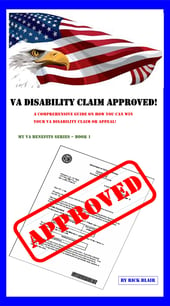The Significance of a VA Nexus Letter for Veterans Affairs Disability Claims
Why a NEXUS Letter is Important
12/29/20236 min read
Although the rules governing VA disability benefits and the VA disability ratings process often seem unfairly stacked against you, the purpose of this book is to educate you on what is needed and how to properly prepare the NEXUS letter of your Veterans benefits claim so you can level the playing field and WIN YOUR VA DISABILITY BENEFITS CLAIM!
Sponsored Advertisement


Sponsored Advertisement


What Is a VA Nexus Letter?
A VA nexus letter is a document that is provided by a Veteran’s Affairs (VA) doctor that states that in their opinion, there is a connection between the Veteran’s disability and their military service. The nexus letter is an important part of the VA benefits application process, as it provides supporting evidence for the Veteran’s claim.
The Veterans Benefits Administration (VBA) defines a nexus as “a relationship between the existence of a disability and the veteran’s military service.” In order to be successful in obtaining VA benefits, the Veteran must be able to prove that their disability is a result of their military service. The nexus letter from a VA doctor is one way to provide this evidence.
VA doctors are not required to provide nexus letters, but many will do so if the Veteran requests one. It is important to note that the nexus letter is not a guarantee of benefits, but it can be helpful in supporting the Veteran’s claim.
What Benefits Does a VA Nexus Letter Provide?
A nexus letter is a key piece of evidence in any Veterans Affairs (VA) disability claim. It is a written opinion from a medical professional that links a veteran’s current diagnosis to their time in service. This letter can be submitted by a doctor, psychiatrist, or other medical provider.
A nexus letter is not required to file a VA disability claim, but it can be extremely helpful in getting a claim approved. The letter should be written by a medical professional who has treated the veteran for their current condition. It should explain how the veteran’s current diagnosis is related to their time in service.
A nexus letter can make the difference between a VA disability claim being approved or denied. If a veteran’s claim is denied, they can appeal the decision. If the veteran has a nexus letter, they can submit it as new evidence in their appeal.
A nexus letter can also help a veteran get a higher rating for their disability. The higher the rating, the more money the veteran will receive each month. A nexus letter can also help a veteran get access to other benefits, such as healthcare and education.
Who Should Write a VA Nexus Letter?
A VA nexus letter is a letter written by a medical professional that establishes a connection between an individual’s military service and their current disability. The letter is used to support a claim for disability benefits from the Department of Veterans Affairs (VA).
There are a few different situations in which a VA nexus letter may be helpful. For example, if you’re struggling to obtain a diagnosis for a condition that you believe is service-related, a VA nexus letter can help connect your symptoms to your time in the military.
In some cases, a VA nexus letter may also be useful if you have a condition that is not currently listed on the VA’s schedule of disabilities. In order to qualify for benefits for a condition that is not currently listed, you must be able to prove that your condition is related to your time in the military. A VA nexus letter can help establish this connection.
If you’re considering applying for VA disability benefits, you may be wondering who should write your VA nexus letter. The short answer is that anyone who is familiar with your military service and your current medical condition can write a VA nexus letter.
Ideally, your VA nexus letter should be written by a healthcare provider who is familiar with both your military service and your current medical condition. This could be a doctor, nurse, physical therapist, or any other type of medical professional.
If you don’t have a healthcare provider who is familiar with both your military service and your current condition, you may be able to get a VA nexus letter from someone who is familiar with one or the other. For example, if you have a doctor who is familiar with your current condition but not your military service, you could ask them to write a VA nexus letter that outlines your current condition and its symptoms.
In some cases, you may be able to get a VA nexus letter from someone who is familiar with your military service but not your current medical condition. For example, if you served in the military with someone who is now a doctor, they may be able to write a VA nexus letter that outlines your military service and how it has impacted your health.
If you’re having trouble finding someone who is familiar with both your military service and your current medical condition, you may be able to get a VA nexus letter from a general practitioner. However, it’s important to note that a general practitioner may not be familiar with the specific conditions that are common among veterans. As such, they may not be able to provide as much detail in their VA nexus letter as someone who is more specifically familiar with your situation.
If you’re struggling to find someone who can write a VA nexus letter, you may be able to get help from a VA-accredited claims agent or attorney. These professionals are familiar with the VA claims process and can often help connect you with the right people.
If you’re considering applying for VA disability benefits, a VA nexus letter can be a helpful piece of evidence to support your claim. When deciding who should write your VA nexus letter, look for someone who is familiar with both your military service and your current medical condition.
What Should Be Included in a VA Nexus Letter?
A VA nexus letter should include a few key elements in order to be effective. First, it should establish a clear connection between the veteran's current disability and their service-connected injury. This can be done by providing a detailed explanation of the veteran's injury, how it occurred, and how it has impacted their life. Next, the nexus letter should provide evidence to support the claim that the veteran's current disability is a direct result of their service-connected injury. This could include medical records, statements from doctors or treating professionals, and any other supporting documentation. Finally, the nexus letter should be written by a qualified professional who is knowledgeable about the veteran's service-connected injury and its impact on their current condition.
What Are Common Reasons VA Claims Are Rejected?
One of the most frustrating things about the Veterans Affairs (VA) disability benefits claims process is that a claim can be denied for what seems like no good reason. You served your country, and now you're dealing with a debilitating injury or illness that makes it hard to get by. The last thing you want is for your benefits claim to be rejected, but unfortunately, it's not uncommon. In this blog post, we'll discuss some of the most common reasons why VA claims are rejected and what you can do if your claim is denied.
One of the most common reasons for a VA claim denial is that the claimant did not provide enough evidence to support their claim. When you file a claim, the VA will require you to submit evidence to support your case. This might include medical records, doctor's notes, or any other documentation that proves your injury or illness is service-related. If you don't submit enough evidence, or if the evidence you do submit is not strong enough, your claim will likely be denied.
Another common reason for VA claim denials is that the claimant did not meet the VA's eligibility requirements. In order to be eligible for VA disability benefits, you must have a service-related injury or illness that has been diagnosed by a medical professional. If you do not have a diagnosis, or if your diagnosis is not service-related, your claim will be denied.
If your VA claim is denied, don't give up hope. You have the right to appeal the decision, and many claimants are successful on appeal. If you're not sure why your claim was denied, or if you need help gathering evidence to support your appeal, consider working with a VA-accredited attorney or claims agent. They can help you navigate the appeals process and give you the best chance of success.
Sponsored Advertisement


Sponsored Advertisement
Although the rules governing VA disability benefits and the VA disability ratings process often seem unfairly stacked against you, the purpose of this book is to educate you on what is needed and how to properly prepare the NEXUS letter of your Veterans benefits claim so you can level the playing field and WIN YOUR VA DISABILITY BENEFITS CLAIM!

